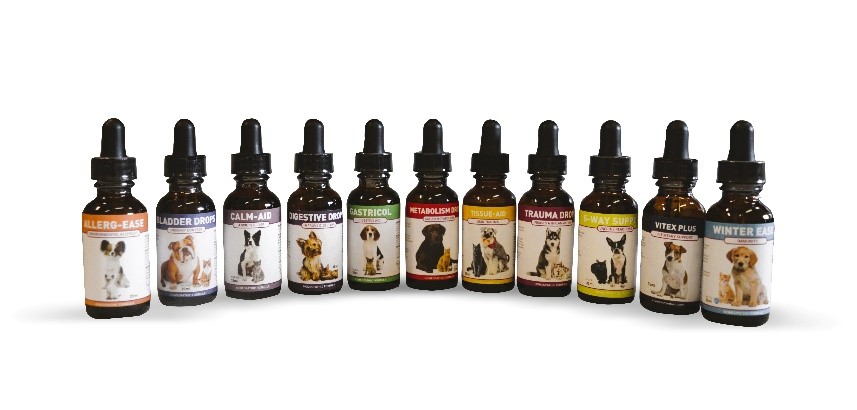Welcome back to my two-part series on Pets & Homeopathy. In Part I we learned about what homeopathy is and how it works. We discussed the difference between homeopathic medicines and pharmaceutical drugs, where homeopathy stands in the health industry today, and the available studies on homeopathy. The many benefits of homeopathy were outlined including effectiveness, safety, minimal to no side-effects, environmental cleanliness, and no animal testing.
Now we are ready to take a more in-depth look at when to use homeopathy, the different forms of homeopathic remedies, potency, and dosage, and selecting and administering the remedies.
When to use Homeopathic Remedies
Homeopathic remedies can be used for virtually all health conditions, including injuries, inflammation, colic, flus, colds, fevers, skin conditions, respiratory problems, allergies, infections, colic, indigestion, hormonal imbalances, anxiety, and behavioural issues. And they are safe for all breeds of cats and dogs and for all ages from the new-born kittens and puppies to our senior animals.
Homeopathic remedies are suited for both acute and chronic conditions but for those people who are using homeopathy as home remedies it is mostly applied to acute problems since these are more easily resolved without the intervention of other health modalities. In acute conditions, homeopathic medicines can be very fast acting. Often improvements are felt within one to two minutes of administering the correct remedy.
Potency & Dosage
Potency refers to the strength of the homeopathic remedy. The most common potencies available are a 6C, 30C, 200C, or 1M. Potencies of 30C or lower are called low-potency remedies or medicines, and potencies of 200C or higher are considered high-potency medicines.
Homeopathic remedies are prepared in professional laboratories using a complex process. A 6C dilution is made by mixing one part of the original mother tincture with 99 parts of water or alcohol. Then the next dilution uses one part of this mixture added to another 99 parts of water and so on until the process has been repeated 6 times. For a 30C potency the process would be repeated 30 times and for a 200C the process would be repeated 200 times. However, between each dilution, the substance is “succussed” or shaken which is how the essence of the remedy is released into the dilution. This is key to manufacturing potentized homeopathic remedies.
The conundrum for chemists regarding homeopathy is that the strength of the remedies increases with the number of dilutions. In other words, the more dilutions that are prepared the more dilute the remedy becomes but the stronger the effect is on the body. This can be explained by the concept that we are not using an increase of molecules to generate potency; rather we are building strength through the vibration in the preparation. The vibrational or energetic frequency increases with the number of times a remedy is succussed.
Lower potencies cover a wide range of symptoms and can be effectively used at home for both the human family and the pets. Generally, the lower the potency the more often it can be repeated as needed. As a rule, unless otherwise instructed, discontinue the remedy as soon as symptoms improve. If symptoms reappear, repeat the remedy and use as needed. If the symptoms do not improve after 2-3 doses discontinue the remedy and choose another one that is better indicated for the current symptoms.
For more severe or very acute symptoms the higher potencies are well indicated but are not repeated as often. This is because the benefits of even just one high potency homeopathic remedy can last for months or for years. Higher potencies are also able to stimulate healing aggravations, so it is better to use these when working with the guidance of a professional homeopath.
Dosage refers to the quantity of the remedy that you use for a dose. For example, if using a remedy in the form of pellets give 2 pellets for a cat or very small dog, and 3-5 pellets for larger dogs. If using a liquid form give 5-10 drops mixed with a small amount of clean water and drop or syringe into the mouth. The Riva’s Remedies homeopathic remedies are combination remedies which are in a bottle with a convenient dropper which you can use to drop the liquid directly into the mouth, or into a little drinking water.
Selecting Homeopathic Remedies
Homeopathic remedies are chosen according to the individual set of symptoms, rather than by a disease label. So, to select the correct remedy, we need to know what sort of symptoms the affected pet is experiencing.
For example, say you want to help a pet who is experiencing fear and anxiety. There are several homeopathic remedies that could help this condition but first we need to know how each pet is experiencing the condition. What are they afraid of? Thunder, loud noises, the dark, strangers, men, people in general, or other dogs for example? Do they hide, tremble, bark non-stop, or get aggressive?
Here are three examples of possible remedies.
Arsenicum Album is a restless remedy, especially at night when they continually change position when sleeping. Arsenicum pets are insecure, experience tremendous anxiety and may suffer panic attacks with trembling and restlessness. They are afraid of dying and of being left alone and have the need to be close to someone. They may have a history of respiratory problems and skin conditions.
Chamomilla pets whine a lot and are more needy. They never feel calm and their nerves always seem to be on edge. They fret easily and they are afraid of the wind. They tend to get irritable and snappy when they do not feel well or are afraid. They have a low pain tolerance and may have a history of ear infections and teething problems.
Phosphorus is a very effective remedy for very sensitive animals that are afraid of loud noises, especially thunder which sends them flying under the covers or mindlessly running away from home. They are also afraid of the dark and deep water. They startle easily and tremble when they are afraid but feel better when reassured. They may have a history of fast development as a puppy or kitten with bone problems.
Administering Homeopathic Remedies
Homeopathic remedies are available in small white sugar tablets, granules, or pellets, as well as in a liquid form which can be syringed, sprayed, or medicine dropped. Homeopathic medicines can also be used topically in the form of an ointment or liniment.
Pellets and liquids should be administered directly into a clean mouth without food, otherwise the essence of the remedy may be absorbed by the food rather than the mucous membranes. To administer homeopathic remedies, pellets can be put inside the lip or into the mouth or offered on the bottom of a clean dish for them to lick up.
Wait until the pellets have dissolved in the mouth, then follow it up with a little treat and they will look forward to their “medicines” every day.
Homeopathic remedies should be stored away from sunshine, strong electrical fields such as computers, refrigerators, stoves, or other appliances, and strong aromatic substances such as essential oils. It is also not advisable to store homeopathic remedies near healing crystals as the different vibrational fields may interfere with one another.

Combination Remedies
Single remedies are highly effective but not everyone is able to take the time to observe the symptoms and match them to the correct remedy. This is especially true in urgent cases or cases where the symptoms are more complex, subtle, or are difficult to observe to the untrained eye. For this reason, Riva’s Remedies offers homeopathic formulations containing multiple remedies to help address common symptoms:
- Enviro-Ease – Supports the immune system and helps stabilize respiratory conditions in pets with breathing problems due to inhalant allergies.
- Metabolism Drops – Supports normal blood sugar levels and healthy metabolism. Balances excess appetite and promotes weight loss.
- Calm-Aid – Promotes calm in pets with tension, stress, and restlessness. Use for travel, separation anxiety, and general nervousness.
- Digestive Drops – Promotes healthy digestion in animals with chronic diarrhea. Supports
digestive processes and absorption.
- Winter-Ease – Maintains a healthy respiratory system in pets with symptoms due to colds, flus, or kennel cough. Helps alleviate fevers, cough, and congestion.
- Tissue-Aid – Abscesses and infections. Use for paws, skin, ears, and eyes.
- Trauma Drops – Sprains, strains, bruising, muscle soreness, stiffness, or trauma.
- Gastricol – Indigestion, bloating, and abdominal pain due to over-eating, eating garbage, or nervous tension.
- 5-Way Support – Supports those
pets who have experienced adverse reactions to vaccines.
- Bladder Drops - Supports normal kidney and bladder function. Can be given to senior dogs or nervous dogs.
- Vitex Plus - Supports hormone balance and healthy pituitary and adrenal function. Maintains a normal hair coat, appetite, weight, and energy levels. Combines well with the Metabolism Drops.
Homeopathy at Home
Homeopathy is an invaluable tool in the family health kit care. It provides an effective, safe, and very convenient option for many common health conditions. Millions of people and their animals from around the world have benefited from the remarkable properties of this quiet energy medicine. And it continues to enjoy increased popularity as more people as well as practitioners are choosing it as a primary health care option. Combined with good nutrition and an appropriate diet our pets can be healthier than ever!
For extensive information on diet, nutrition, and natural healing programs read Healing Dogs Their Way


Marijke van de Water, B.Sc., DHMS
Animal Health & Nutrition Specialist
Homeopathic Practitioner
Medical Intuitive & Healer
Educator & Author
Marijke is a life-long animal lover, the author of Healing Dogs Their Way, and the founder, formulator, and CEO of Riva’s Remedies. She is a gifted healer who has helped thousands of animals live happier, healthier lives.

